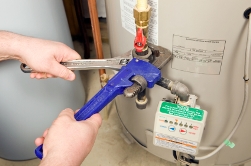Topics to Ask Plumbing Training Schools

Now that you have decided to obtain a certificate, diploma or degree, you can start to narrow down your school options. Since there are so many plumbing trade and vocational schools in the Delta MI region, it's essential to have a checklist of qualifications that each program must satisfy. The initial 2 that we mentioned were location and tuition expense. And while both qualifiers may be important when making your selection, there are additional factors that must be taken into account also. Following is a checklist of those additional qualifications that you will need to analyze prior to selecting a plumber vocational school.
Is the Plumbing School Accredited? Many plumbing trade schools have earned either a regional or a national accreditation. They can earn Institutional Accreditation, which focuses on the school's programs overall, or Programmatic Accreditation, which pertains to an individual program, for instance electrical technology. Make sure that the Delta MI program and school are accredited by a U.S. Department of Education approved accrediting agency, which includes the Accreditation Board for Engineering and Technology. In addition to helping guarantee that you acquire a superior education, it may assist in securing financial aid or student loans, which are in many cases not available for non-accredited programs. Furthermore, many states mandate that the plumbing training course be accredited for it to qualify for certification or licensing.
Is the Plumbing School Licensed? Along with accreditation, an additional way of confirming that a vocational school you’re considering is reputable is by making sure that it’s properly licensed. Licensing is usually regulated and controlled by state agencies, such as the Michigan Department of Education. If you’re not sure, ask the school which state agency regulates its licensing and then check to ensure that it’s up to date.
How Long has the School been in Business? Another means of determining the quality of a technical school is to find out how long it’s been in business. The longer a school has been in operation, the more likely that its programs are highly rated and regarded. Conversely, schools that are not well regarded or that provide low quality training generally don’t stand the test of time. However, keep in mind that even the best of Delta MI schools had to start from their first day of operation, so only use it as one of several qualifications for each school you are considering.
What are the School’s Completion and Placement Rates? Ask the plumbing schools you are considering what their completion rates are. The completion rate is the percentage or portion of students who enroll in and finish the program. A lower completion rate could signify that students were unhappy with the program and quit. It could also indicate that the teachers were not qualified to train the students. It's also essential that the schools have high job placement rates. Older and/or more reputable schools may have a more extensive directory of graduates, which can produce more contacts for the school to employ for their apprenticeship and job placement programs. A high job placement rate can not only affirm that the school has a good reputation within the trade, but additionally that it has the network of contacts to assist grads acquire apprenticeships or employment in the Delta MI area.
Are Apprenticeship Programs Sponsored? Most plumber training programs are taught together with an internship or an apprenticeship program. Those participating vocational and trade schools will help place you in an apprenticeship program inside their network of plumbing businesses or labor unions. Ask if the schools you are considering have working partnerships with local Delta MI plumbers or plumbing companies. An apprenticeship not only offers a valuable experience by furnishing practical training, but it also supplies employment opportunities and helps to establish relationships in the regional plumbing professional community.
Are there Modern Facilities? Make sure that the school facilities and the equipment that you will be instructed on are state-of-the-art and what you will be working with in the field. If you are currently in an internship or an apprenticeship, check with the master plumber you are working under regarding what you should be expecting. If not, ask a local Delta MI plumbing contractor if they can give you some suggestions.
Where is the School Located? Unless you are willing to relocate, the school needs to be within commuting distance of your Delta MI home. Remember that if you decide to attend an out-of-state school, in addition to moving costs there can be higher tuition charges compared to in-state residents.
Are there Smaller Classes? It's important that you receive as much individualized training as possible, which can be difficult in bigger classes. Ask if you can monitor a couple of the classes so that you can observe how big they are and witness first hand the interaction between students and teachers. Speak with a few of the students and get their opinions relating to class sizes and instruction. Finally, talk to a few of the instructors and find out what their level of experience is in Delta MI and what degrees or certifications they have earned.
Is the Class Schedule Convenient? Make sure that the class schedules for the programs you are assessing are flexible enough to meet your needs. If you can only attend classes in the evening or on weekends near Delta MI, confirm that the programs you are comparing provide those options. If you can only attend on a part-time basis, be sure that the school you select offers part-time enrollment. Finally, ask what the policy is to make-up classes should you miss any due to work, illness or family responsibilities.
